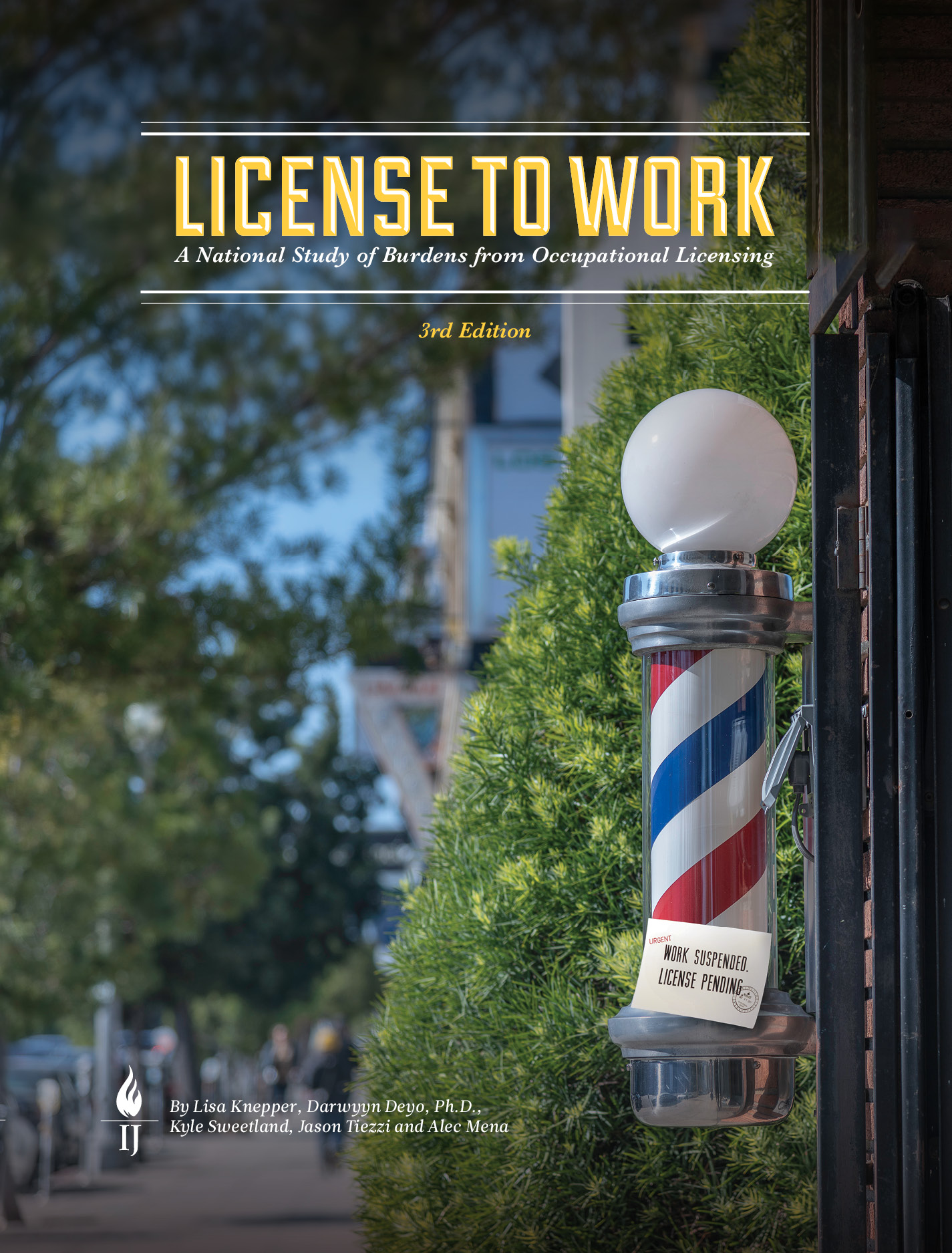Iron/Steel Contractor (Commercial) Occupational Licensing
License required in 26 states
23rd most burdensome licensing requirements among moderate-income occupations
Average Fee for License:$370
What They Do
Iron and steel contractors contract with clients to raise, place and unite iron or steel girders, columns and other structural members to form completed structures or structural frameworks. They may also erect metal storage tanks and assemble prefabricated metal buildings. Typically, only contractors require licenses, not the steel fabricators or welders who work for them. In some states, licensing requirements differ based on the setting. Those with a residential license may work only on residential properties, while those with a commercial license may work on commercial properties. Other states require the same license regardless of the setting, and this report records that license in both settings. Many states have contract minimums before the contractor’s license applies. See Appendix B for details.
Iron/Steel Contractor (Commercial) Licensing Overview
Twenty-six states (more than half of states) require a licence to work as an Iron/Steel Contractor (Commercial). On average, these laws require $370 in fees, 441 days of education and about 1 exam. Iron/Steel Contractor (Commercial) Licenses have the 23rd most burdensome requirements of the 102 occupations studied. Fees for a license exceed $1000 in Nevada.
Where is an Iron/Steel Contractor (Commercial) the most regulated?
Out of the 26 states that require an occupational license, an occupational license for a Iron/Steel Contractor (Commercial) has the highest burden in Nevada. Nevada requires $1040 in fees, 2 exams, 4 years experience, and no education.
Where is an Iron/Steel Contractor (Commercial) the least regulated?
Out of the 26 states that require an occupational license, an occupational license for a Iron/Steel Contractor (Commercial) has the lowest burden in Nebraska. Nebraska requires $0 in fees, no exams, no experience, and no education.
Where is an Iron/Steel Contractor (Commercial) license the most expensive?
An occupational license for a Iron/Steel Contractor (Commercial) costs the most in Nevada. Nevada requires $1040 in fees, 2 exams, 4 years experience, and no education.
Where is an Iron/Steel Contractor (Commercial) license the least expensive?
An occupational license for a Iron/Steel Contractor (Commercial) costs the least in Nebraska. Nebraska requires $0 in fees, no exams, no experience, and no education.
Where does it take the longest to obtain an Iron/Steel Contractor (Commercial) license?
An occupational license for a Iron/Steel Contractor (Commercial) takes the longest to obtain in Oregon. It takes 1463 days (4 years and 3 days). Oregon requires $310 in fees, 1 exams, 4 years experience, and 16 clock hours education.
Where is it fastest to obtain an Iron/Steel Contractor (Commercial) license?
An occupational license for a Iron/Steel Contractor (Commercial) takes the least time to obtain in North Carolina, West Virginia, Rhode Island, District of Columbia, North Dakota, Tennessee, Connecticut, Alaska, Washington, Iowa, Idaho, Nebraska (0 days).
What states require exams for an Iron/Steel Contractor (Commercial) license?
To obtain an occupational license for an Iron/Steel Contractor (Commercial) there is at least one exam required in: Nevada, Arizona, California, Hawaii, Florida, Oregon, New Mexico, Virginia, South Carolina, Arkansas, Mississippi, Alabama, Louisiana, North Carolina, West Virginia, Tennessee. California requires 3 exams.
Twenty-six states license iron and steel contractors working on commercial properties. Eleven states require between two and five years of experience working under a licensed contractor. Alabama and Mississippi require completion of three contracted jobs. Thirteen states require no experience. On average, states require 525 days of education and experience, $368 in fees ($1,078 in Nevada), and about one exam. These high barriers give commercial iron/steel contractors the 23rd most burdensome requirements of the 102 occupations studied.
States Ranked by Average Licensing Burden for 102 Lower-Income Occupations
More Burdensome Less Burdensome
Based on data released in November 2022| Burden Rank | State | Occupations Licensed | Fees | Estimated Calendar Days Lost | Education | Experience | Exams | Minimum Grade | Minimum Age |
|---|---|---|---|---|---|---|---|---|---|
| 1 | Nevada | 75 | $1,040 | 1460 | None | 4 years | 2 | 0 | 18 |
| 2 | Arizona | 68 | $896 | 1460 | None | 4 years | 2 | 0 | 18 |
| 3 | California | 75 | $579 | 1460 | None | 4 years | 3 | 0 | 18 |
| 4 | Hawaii | 64 | $694 | 1460 | None | 4 years | 2 | 0 | 18 |
| 5 | Florida | 55 | $364 | 1460 | None | 4 years | 1 | 0 | 18 |
| 6 | Oregon | 69 | $310 | 1463 | 16 clock hours | 4 years | 1 | 0 | 18 |
| 7 | New Mexico | 66 | $324 | 730 | None | 2 years | 2 | 0 | 18 |
| 8 | Virginia | 72 | $320 | 731 | 8 clock hours | 2 years | 1 | 0 | 18 |
| 9 | South Carolina | 60 | $310 | 730 | None | 2 years | 2 | 0 | 0 |
| 10 | Arkansas | 72 | $180 | 365 | None | 1 years | 1 | 0 | 0 |
| 11 | Mississippi | 65 | $640 | 67 | None | 3 jobs, contractors | 2 | 0 | 0 |
| 12 | Alabama | 63 | $492 | 67 | None | 3 jobs, contractors | 2 | 0 | 0 |
| 13 | Louisiana | 77 | $400 | 0.2 | 1 clock hours | None | 2 | 0 | 0 |
| 14 | North Carolina | 66 | $154 | 0 | None | None | 1 | 0 | 18 |
| 15 | West Virginia | 67 | $195 | 0 | None | None | 2 | 0 | 0 |
| 16 | Rhode Island | 70 | $200 | 0 | None | None | 0 | 0 | 18 |
| 17 | District of Columbia | 61 | $655 | 0 | None | None | 0 | 0 | 0 |
| 18 | North Dakota | 65 | $100 | 0 | None | None | 0 | 0 | 18 |
| 19 | Tennessee | 69 | $307 | 0 | None | None | 1 | 0 | 0 |
| 20 | Connecticut | 65 | $500 | 0 | None | None | 0 | 0 | 0 |
| 21 | Utah | 64 | $405 | 4 | 25 clock hours | None | 0 | 0 | 0 |
| 22 | Alaska | 64 | $350 | 0 | None | None | 0 | 0 | 0 |
| 23 | Washington | 76 | $118 | 0 | None | None | 0 | 0 | 0 |
| 24 | Iowa | 71 | $50 | 0 | None | None | 0 | 0 | 0 |
| 25 | Idaho | 66 | $50 | 0 | None | None | 0 | 0 | 0 |
| 26 | Nebraska | 61 | $0 | 0 | None | None | 0 | 0 | 0 |

License to Work
The data and information here come from IJ’s License to Work report, released in November 2022.
View Report

